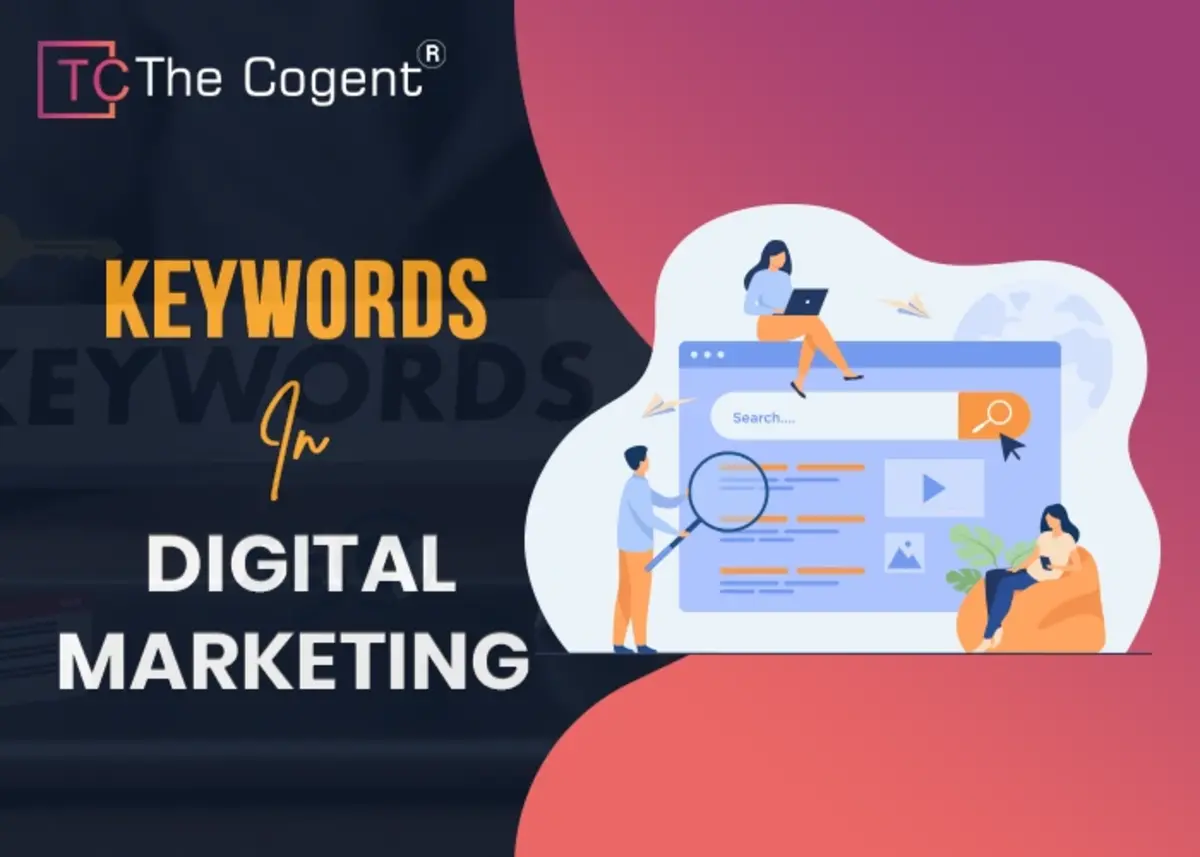Keywords in Digital Marketing are words or groups of words used by Internet users to perform a search on a search engine or search bar. Users use keywords on search engines to find out the answer to their queries. Keywords play a vital role in digital marketing and SEO (Search Engine Optimization). Using the right keywords can help increase visibility, attract more traffic, as well as improve your website’s ranking on search engines.
The keyword is the word or phrase that defines the content of a webpage or online platform. In a SEO company in Jaipur, the first step of SEO is Keyword research. In this article, we would discuss the types and importance of keywords in digital marketing.
Table of Contents
What is Keyword Research?
Importance of Keywords in Digital Marketing?
Types of Keywords
Keywords in SEO
Steps of Keyword Research For Your Content:
How To Add Keywords in Content:
Benefits of Using Keywords in Digital Marketing
- Help to increase visibility
- Better Targeting of the Audience
- Improved user experience
- Better Conversion Rates
Mistakes when using keywords in your digital marketing
Conclusion
What is Keyword Research?
Keyword research is a process of identifying and analyzing the keywords that people use to search for a particular product or service. It is an essential step in digital marketing and SEO as it helps you understand the target audience’s search intent and behaviour. Keyword research involves finding the best keywords for digital marketing agencies and incorporating them into your website content, meta tags, and other online platforms.
Importance of Keywords in Digital Marketing
Keywords play a pivotal role in the world of digital marketing, where they hold the key to a website’s visibility and overall success. As search engines constantly advance, the creation of SEO-optimized content becomes imperative in order to thrive in the online realm. Understanding the significance of keywords and incorporating them effectively into your content is essential for ensuring a strong online presence. By doing so, you can enhance your website’s chances of reaching and engaging with your target audience, ultimately driving growth and success.
1. Enhanced Search Engine Ranking:
- Targeting relevant keywords allows search engines to index your content accurately, leading to higher rankings on search engine result pages (SERPs).
- Proper keyword placement within your content, meta tags, and headings helps search engines understand your content’s relevance to user queries.
2. Driving Organic Traffic:
- Keywords act as bridges between what users are searching for and the content you provide. Optimizing content with the right keywords increases the chances of attracting organic traffic to your website.
- Long-tail keywords, which are more specific phrases, can drive highly targeted traffic and improve conversion rates.
3. Audience Understanding:
- Keyword research provides valuable insights into your target audience’s needs, preferences, and pain points. Understanding these helps you tailor your content to address their interests effectively.
- Identifying and incorporating trending or popular keywords can also keep your content up-to-date and relevant.
4. Competitive Advantage:
- Conducting comprehensive keyword research enables you to identify gaps in your competitors’ content strategies and capitalize on unexplored opportunities.
- By targeting unique or niche keywords, you can stand out in a crowded digital landscape and attract a specific audience segment.
5. Improved Content Relevance:
- Integrating keywords naturally into your content ensures that it remains relevant and valuable to both users and search engines.
- Avoid keyword stuffing, as it not only harms readability but also leads to penalties from search engines.
6. Better Click-Through Rates (CTRs):
- Relevant and enticing keywords in meta titles and descriptions can significantly improve CTRs when displayed on search results pages.
- A compelling meta description with the right keywords can encourage users to click on your link over others.
7. Facilitating Content Planning:
- Keywords aid in structuring your content strategy by guiding the creation of blog posts, articles, videos, and other media that align with your target audience’s interests.
- They help ensure a cohesive and consistent theme throughout your content.
8. Adaptability and Analysis:
- Regularly analyzing keyword performance allows you to adapt your content strategy based on changing trends and user behavior.
- Tools like Google Analytics and Search Console provide valuable data on keyword performance, aiding in further optimization.
9. Performance Tracking and Analysis:
Keywords are essential for monitoring the performance of your content. By analyzing the performance of specific keywords, you can identify what works best for your audience, enabling you to refine your digital marketing strategies accordingly.
10. Adaptation to Algorithm Changes:
Search engine algorithms evolve regularly, impacting search rankings. By keeping track of keyword trends and staying updated on algorithm changes, you can adapt your content to remain relevant and maintain your online visibility.
Types of Keywords:
There are six types of Keywords in digital marketing that are commonly used:
Short-tail keywords:
Short-tail keywords are short, generic terms that are often used to describe a broad topic. For example, “shoes” or “pizza” are examples of short-tail keywords.
These keywords are usually very competitive, meaning that many websites are trying to rank for them, making it difficult to achieve a high ranking in search engine results pages (SERPs). However, they can be the best keywords for a digital marketing agency to generate a large volume of traffic to your site.
Long-tail keywords:
Long-tail keywords are longer, more specific phrases that are used to describe a more focused topic. For example, “men’s running shoes” or “vegan pizza delivery” are examples of long-tail keywords.
These keywords are less competitive than short-tail keywords, meaning that it is easier to achieve a high ranking in SERPs. Long-tail keywords are also more likely to convert to sales, as they are often used by people who are actively searching for a specific product or service.
Branded keywords:
Branded keywords are keywords that include your brand name or variations of it. For example, “Nike shoes” or “Papa John’s pizza” are examples of branded keywords. These keywords are often used by people who are already familiar with your brand, and they can be effective for driving traffic to your site and increasing brand recognition.
Competitor keywords:
Competitor keywords are keywords that include the names of your competitors or variations of them. For example, “Adidas shoes” or “Domino’s Pizza” are examples of competitor keywords. These keywords can be useful for driving traffic away from your competitors’ sites and towards your own site.
Product keywords:
Product keywords are keywords that include the names of specific products or services that you offer. For example, “Air Jordan shoes” or “pepperoni pizza” are examples of product keywords. These keywords are often used by people who are actively searching for a specific product or service, making them more likely to convert to sales.
Geo-targeted keywords:
Geo-targeted keywords are keywords that include location-specific terms. For example, “New York pizza delivery” or “Chicago running shoes” are examples of geo-targeted keywords. These keywords can be useful for targeting customers in specific geographic locations and for improving local SEO.
Using a variety of keyword types can help to create a well-rounded SEO strategy that targets a range of customers and search queries. Short-tail keywords can be effective for generating a large volume of traffic, while long-tail keywords are more likely to convert to sales.
Branded keywords can increase brand recognition, while competitor keywords can drive traffic away from your competitors. Product keywords are effective for targeting customers who are actively searching for a specific product or service, and geo-targeted keywords can improve local SEO.
Keywords in Digital Marketing are the heart of SEO:
Keywords are the heart of SEO because they help search engines understand the content of your website and rank it accordingly. Using the right keywords in your website content, meta tags, and other online platforms can help you to appear higher in search engine results pages (SERP), which can lead to increased visibility, traffic, and, ultimately, sales.
Steps of Keyword Research For Your Digital Marketing Content:
- Brainstorm Ideas: Start by brainstorming ideas related to your product or service. Use online tools for example Google Keyword Planner or SEMrush to get ideas for relevant keywords.
- Organize Your List: Organize your list of keywords into categories based on their search intent and behaviour. For example, create a category for “product keywords” and another category for “informational keywords.”
- Research More Terms: Use online tools to research more terms related to your categories. Look for long-tail keywords that have low competition and high search volume.
- Be Thorough And Detail-oriented: Be thorough and detail-oriented when researching your keywords. Look for related terms, synonyms, and variations of your keywords.
- Evaluate Your List: Evaluate your list of keywords based on their search volume, competition, and relevance to your product or service.
- Finalize Your List: Finalize your list of keywords and use them in your website content, meta tags, and other online platforms.
How To Add Keywords in Digital Marketing Content:
Once you have finalized your list of keywords for a digital marketing agency, it’s time to add them to your website content, meta tags, and other online platforms. Here are some tips on how to add keywords to digital marketing content:
- Use keywords in your page titles, meta descriptions, and headers.
- Use keywords in your website content, but make sure to use them naturally and don’t stuff them.
- Use keywords in your image, alt tags, and filenames.
- Use keywords in your URL structure.
- Use keywords in your anchor text for internal and external links.
- Use keywords in your social media posts and profiles.
It’s important to note that while keywords are essential in digital marketing. Overusing keywords, also known as keyword stuffing, can harm your website’s ranking and credibility.
Here are some tips on how to add keywords in content:
Headers and Subheaders
Headers and subheaders play an important role in keyword optimization for SEO purposes. When you use keywords or phrases in headers and subheaders, it signals to search engines that the content on the page is relevant to those keywords or phrases.
Headers and subheaders are also important for organizing content and improving the user experience. They help break up content into sections and make it easier for readers to scan and find the information they’re looking for.
Link Text
The link text, also known as anchor text, plays an important role in keyword optimization for search engine optimization (SEO) purposes. When you use a keyword or a phrase as the anchor text for a hyperlink, it sends a signal to search engines that the linked page is relevant to the keyword or phrase used.
For example, if you have a website about dog grooming and you want to link to a page that talks about dog shampoo, using “dog shampoo” as the anchor text of the hyperlink helps search engines understand that the linked page is related to dog shampoo.
However, it’s important to use anchor text appropriately and avoid over-optimization or spamming. Using the same keyword-rich anchor text repeatedly or using irrelevant keywords in the anchor text can be viewed as manipulative by search engines and may result in penalties or lower rankings. It’s best to use anchor text that is natural and descriptive of the linked page.
Using keywords in your graphics
Using keywords in your graphics can be an effective way to improve your search engine optimization (SEO) efforts. When creating graphics, such as infographics or charts, it’s important to include relevant and descriptive text that includes your target keywords.
One way to include keywords in graphics is to use them in the title or headline of the graphic. This can help search engines understand the content of the graphic and the page it appears on. Additionally, you can use keywords in the captions or descriptions of the graphic to provide more context and information to users and search engines.
It’s important to note that while using keywords in your graphics can be helpful for SEO, it’s also important to focus on creating high-quality, visually appealing graphics that provide value to users.
Overusing keywords or creating low-quality graphics just for the sake of including keywords can actually harm your SEO efforts in the long run. Therefore, it’s best to strike a balance between optimizing for keywords and creating high-quality graphics that provide value to your audience.
Alt Tag
The alt tag, or alternative text tag, is an HTML attribute used to provide a text description of an image on a webpage. The alt tag serves two main purposes:
- Accessibility: The alt tag provides a text alternative for users who are visually impaired or have a slow internet connection and cannot load images.
- SEO: Search engines use the alt tag as a signal to understand the content of an image and to determine the relevance of a webpage to a particular search query. Including relevant keywords in the alt tag can help search engines understand the content of the image and the page it appears on.
However, it’s important to note that the primary purpose of the alt tag is to provide an accurate and descriptive text alternative for the image, not to stuff it with keywords for SEO purposes. Overuse of keywords in alt tags can be seen as spam and may actually harm your search engine rankings. It’s important to use descriptive, concise, and accurate alt text that accurately describes the image and its content.
Filename
The filename of a document or webpage can play a role in keyword optimization for search engines. Search engines use the filename as one of many signals to help determine the relevance and content of a page.
Including relevant keywords in the filename can help search engines understand what the page is about and can potentially improve the page’s ranking for those keywords. For example, if you have a web page about “hiking trails in California,” using a filename like “California-hiking-trails.html” can signal to search engines that the page is relevant to that topic.
However, it’s important to note that the filename is just one small factor in a larger SEO strategy. It’s more important to focus on creating high-quality, relevant content that provides value to users. Additionally, using too many keywords in a filename can be seen as spam and may actually hurt your search engine rankings.
Benefits of Using Keywords in Digital Marketing
Help to increase visibility
Keywords in digital marketing help to increase visibility and traffic on the website. Using relevant keywords in content, in digital marketing efforts and in search engine optimization strategies will boost ranking in Search engine results pages(SERPs). It results to target our audience and leading to increased traffic and potentially more conversion.
Better Targeting of the Audience
Another benefit of using keywords in digital marketing is that it helps you better target your intended audience. You can ensure that your brand is more easily discovered by users who are searching for products or services similar to yours by increasing relevance in content, social media posts and paid advertising campaigns. As a result, you’ll reach a more qualified and interested audience, which will result in higher engagement and conversion rates.
In addition to optimizing keywords, you can gain valuable insights into what your target audience is searching for, which can inform your digital marketing strategy.
Improved user experience
You can make search engines more likely to understand the topic of your website by incorporating relevant keywords into your website content and meta description. This makes it easier for users who are searching for information related to those keywords to find your site.
Using keywords in your website content will increase your search engine ranking, visibility, and click-through rates. In addition, using keywords will help your target audience find what they are looking for on your website more easily and improve their overall experience. Your digital marketing strategy should include keywords to enhance your website’s user experience and drive targeted traffic.
Better Conversion Rates
By using keywords in digital marketing, you can optimize your content for search engines, making it easier for potential customers to find you. With greater visibility, you can reach a wider, more relevant audience, which can increase your conversion rates. It is also possible to use keywords to target specific customer needs and search queries, resulting in a better user experience and a greater chance of conversion.
Avoid these mistakes when using keywords in your digital marketing
The overuse of resources
It is a common mistake in digital marketing also known as keyword stuffing. In an effort to rank higher in search engines, this practice involves stuffing an excessive amount of keywords into a single piece of content. It results in low-quality, unreadable content that can be penalized by search engines or even banned completely from search engine results pages. In order to maximize the effectiveness of keywords, they must be strategically placed within the content in a way that adds value to the user experience.
Searching for keywords without doing any research
These Digital marketing mistakes like this are common. When your target audience searches for products or services similar to yours, keyword research helps you understand their words and phrases. Without researching keywords, you may use irrelevant or low-traffic keywords in digital marketing campaigns, leading to a low return on investment and a weak online presence. Identify your business and use the most effective keywords and include them in your content, copy, and meta descriptions for maximum impact. It’s one of the best tips for beginners when writing content, which will make you stand out.
Keyword Strategy and Search Algorithms
Keep up-to-date with changes in search algorithms to maximize the effectiveness of your keyword strategy. To better understand the relevance and quality of content, search engines like Google constantly update their algorithms. Unless you adapt your approach to these changes, your website will become less visible and have less traffic. To ensure your keywords strategy remains relevant and effective, it is essential to keep yourself informed and make necessary changes.
Conclusion
Keywords are an essential element of digital marketing and SEO. They help search engines understand the content of your website and rank it accordingly. By conducting keyword research and incorporating the best keywords for digital marketing agencies into your website content, meta tags, and other online platforms, you can increase your website’s visibility, traffic, and, ultimately, sales.
It’s crucial to use keywords strategically and avoid excessive keyword stuffing. Remember to always focus on providing high-quality content that is relevant to your target audience it is one of the best methods used by The Cogent.



